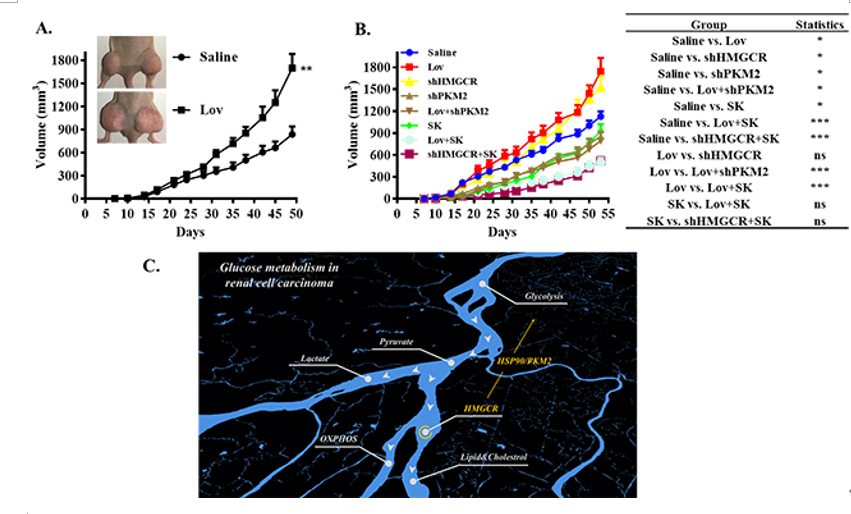The Shengli Mi research team from Tsinghua SIGS has recently revealed the regulatory mechanism that inhibits cholesterol synthase HMGCR leading to the accelerated growth of renal cell carcinoma in an article published in PLOS Biology.
Renal cell carcinoma (RCC) is responsible for most cases of kidney cancer. While previous research has shown that low serum levels of cholesterol are positively correlated with poorer RCC-specific survival outcomes, the underlying mechanisms and functional significance of the role of cholesterol in RCC development remain obscure.
In this study, the Shengli Mi team demonstrated that the inhibition of 3-Hydroxy-3-methylglutaryl coenzyme A reductase (HMGCR) could accelerate the development of RCC tumors by lactate accumulation and angiogenesis in animal models. HMGCR plays a pivotal role in RCC development as it is the key rate-limiting enzyme of the cholesterol biosynthetic pathway. The group identified that the inhibition of HMGCR led to an increase in glycolysis via the regulated HSP90 expression levels, thus maintaining the levels of a glycolysis rate-limiting enzyme, pyruvate kinase M2 (PKM2). Based on these findings, they reversed the HMGCR inhibition-induced tumor growth acceleration in RCC xenograft mice by suppressing glycolysis. Furthermore, the co-administration of Shikonin, a potent PKM2 inhibitor, reverted the tumor development induced by the HMGCR signaling pathway.

Effect of HMGCR expression level on kidney cancer patient survival. (A) Kidney renal clear cell carcinoma (KIRC) and (B) kidney renal papillary cell carcinoma (KIRP). Expression of HMGCR in primary tumor samples and normal kidney tissue. (C) Kidney renal clear cell carcinoma and (D) kidney renal papillary cell carcinoma.

(A) Inhibition of HMGCR by lovastatin (Lov) promoted RCC tumor growth. (B)Glycolysis suppression reverses HMGCR inhibition induced tumor growth in xenograft mice. (C)Schematic diagram of HMGCR regulating glycolysis during the glucose metabolism of RCC cells.
The study was published in the journal PLOS Biology entitled “HMGCR inhibition stabilizes the glycolytic enzyme PKM2 to support the growth of renal cell carcinoma” on April 27, 2021. The first authors of this paper are Jiajun Huang and Xiaoyu Zhao from Tsinghua SIGS, while the corresponding author is Associate Prof. Shengli Mi. This study was supported by the Project of Basic Research of Shenzhen, China.
Link to full article: https://journals.plos.org/plosbiology/article?id=10.1371/journal.pbio.3001197
Writer: Jiajun Huang
Editors: Karen Lee, Li Han



